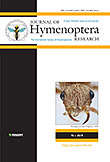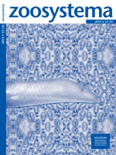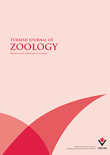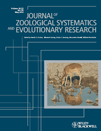
Redia-Journal of Zoology
Scope & Guideline
Fostering insights in ecology and conservation.
Introduction
Aims and Scopes
- Biodiversity Studies:
The journal encompasses research on the diversity of animal species, including faunistic surveys and taxonomic studies, which contribute to the understanding of species distribution and conservation. - Ecological Interactions:
Research investigating the ecological relationships between different species and their environments, including predator-prey dynamics, symbiotic relationships, and the impact of environmental changes on wildlife. - Invasive Species Research:
A focus on the biology and ecological impacts of invasive species, including their spread, effects on native fauna, and management strategies. - Molecular and Genetic Analysis:
Studies utilizing molecular techniques for species identification, population genetics, and phylogenetic analyses, enhancing the understanding of evolutionary relationships among taxa. - Conservation Biology:
Research aimed at understanding and mitigating the threats to wildlife, including habitat destruction, climate change, and pollution, with a focus on conservation strategies and policy implications. - Citizen Science and Public Engagement:
The incorporation of citizen science approaches to gather data and engage the public in biodiversity monitoring and conservation efforts.
Trending and Emerging
- Impact of Climate Change on Fauna:
There is a growing emphasis on understanding how climate change affects animal populations and their habitats, highlighting the urgency of addressing these changes in conservation strategies. - Urban Ecology:
Research focusing on animal behavior and biodiversity in urban environments is gaining traction, reflecting the increasing importance of understanding how wildlife adapts to urbanization. - Use of Citizen Science in Biodiversity Research:
The integration of citizen science methodologies in data collection and monitoring is trending, allowing for broader participation and enhanced data quality in biodiversity studies. - Conservation Genetics:
An increased focus on genetic studies that inform conservation practices, such as understanding genetic diversity and population structure of endangered species, is becoming more prominent. - Microbial Interactions and Health of Wildlife:
Emerging research on the role of microbial communities in the health and ecology of animal populations is gaining interest, particularly in relation to disease dynamics and ecosystem health.
Declining or Waning
- Traditional Taxonomy:
Although taxonomic studies remain important, there seems to be a waning emphasis on purely descriptive taxonomy without applied ecological or conservation context. - Generalized Ecological Studies:
Research that does not address specific ecological questions or lacks a strong methodological framework appears to be decreasing, as the journal shifts towards more targeted and impactful studies. - Local Faunistic Surveys without Broader Implications:
While local faunistic surveys are still published, those lacking implications for conservation or broader ecological understanding are less frequent. - Historical Ecology:
Research focused solely on historical ecological perspectives without current relevance or application is becoming less common, as contemporary ecological challenges gain more attention.
Similar Journals

JOURNAL OF HYMENOPTERA RESEARCH
Connecting Researchers, Inspiring DiscoveriesJOURNAL OF HYMENOPTERA RESEARCH is a leading open-access publication dedicated to the advancement of knowledge in the fields of Insect Science, Animal Science and Zoology, and Ecology. Published by Pensoft Publishers since 2011, this journal plays a critical role in facilitating the exchange of significant research findings and insights related to Hymenoptera, a diverse order of insects that includes bees, wasps, and ants. With a commendable impact factor and ranked in the Q1 category for Insect Science and Animal Science, the journal stands out within the scientific community, drawing contributions from researchers globally. Boasting an ISSN of 1070-9428 and an E-ISSN of 1314-2607, the journal not only ensures broad accessibility to its content but also fosters a collaborative environment for professionals and students alike to engage with pioneering research. By reflecting on the converged years of 2007-2024, the JOURNAL OF HYMENOPTERA RESEARCH remains a vital resource for understanding the ecological and evolutionary dynamics of this important group of insects, solidifying its position as a cornerstone in entomological studies.

CYBIUM
Connecting researchers to the pulse of aquatic life.CYBIUM is a reputable journal published by the Société Française d'Ichtyologie, dedicated to advancing research within the fields of Animal Science and Zoology as well as Ecology, Evolution, Behavior and Systematics. With a commitment to fostering scientific dialogue, CYBIUM has been a valuable resource for scholars since its inception in 1996, reporting on a wide array of ichthyological studies and aquatic biology. The journal is recognized in the 2023 Scopus rankings with a notable position in the Q3 quartile for Animal Science and Zoology and Q4 for Ecology, Evolution, Behavior and Systematics, reflecting its growing influence in these disciplines. Although currently not categorized as Open Access, CYBIUM continues to provide essential insights into fish biology and ecology from the heart of France, the Museum national d'Histoire naturelle in Paris. Researchers, professionals, and students in related fields will find CYBIUM an indispensable tool for staying informed about the latest developments and research trends within ichthyology and marine sciences.

BELGIAN JOURNAL OF ZOOLOGY
Connecting Researchers with Cutting-Edge Zoological Insights.The BELGIAN JOURNAL OF ZOOLOGY, published by the Royal Belgian Zoological Society, serves as a prominent platform for advancing research in the field of zoology. With an impact factor reflecting its status within the academic community, this journal rigorously publishes innovative studies and reviews, covering a broad spectrum of topics related to animal science and zoology. As an esteemed outlet, the journal ranks in the Q2 category for both Animal Science and Zoology, demonstrating its relevance and contribution to the field, as indicated by its Scopus ranking of 255 out of 490. Although it operates under a subscription model, the journal is committed to disseminating high-quality research that can shape contemporary understanding of animal biology and ecology. With a publication history dating back to 1990 and extending through 2024, researchers, professionals, and students are encouraged to engage with its rich content, which is vital for ongoing discourse and discovery within zoological sciences.

Journal of Vertebrate Biology
Advancing knowledge in vertebrate biology.Journal of Vertebrate Biology, a reputable publication established by the Institute of Vertebrate Biology in the Czech Republic, serves as a vital platform for research across the fields of Animal Science and Zoology, Aquatic Science, and Ecology, Evolution, Behavior and Systematics. With its ISSN 2694-7684 and a commendable 2023 Q2 ranking in multiple categories, this open-access journal embraces innovative scientific inquiry and fosters academic discourse. The journal's commitment to disseminating high-quality research is reflected in its Scopus rankings, positioning it within the top quartile in several impactful areas. As it continues to converge its focus until 2024, researchers, professionals, and students alike are encouraged to engage with cutting-edge studies that advance our understanding of vertebrate biology. This publication stands out not only in its scholarly contributions but also in enhancing global awareness of biodiversity and conservation issues.

ZOOSYSTEMA
Illuminating Evolutionary ProcessesZOOSYSTEMA is a prestigious academic journal published by PUBLICATIONS SCIENTIFIQUES DU MUSEUM, PARIS, specializing in the fields of Animal Science, Zoology, and Ecology. With a focus on advancing the understanding of biodiversity and evolutionary processes, this journal serves as a vital platform for researchers to disseminate significant findings and foster discussions within the scientific community. Boasting an impressive categorization in the Q2 Quartile rankings for both its primary fields, ZOOSYSTEMA is recognized for its impact and quality, as indicated by its notable positions in the Scopus rankings. While currently not Open Access, the journal provides essential insights and comprehensive reviews across its volumes published since 1998, making it a cornerstone in zoological and ecological research. Researchers, professionals, and students alike will find ZOOSYSTEMA an invaluable resource for understanding complex biological systems and their interrelations, contributing to informed conservation and management efforts globally.

TURKISH JOURNAL OF ZOOLOGY
Fostering Global Collaboration in Animal ScienceThe TURKISH JOURNAL OF ZOOLOGY, published by the esteemed Tubitak Scientific & Technological Research Council Turkey, serves as a pivotal platform for the dissemination of research in the field of zoology and animal science. With an ISSN of 1300-0179 and an E-ISSN of 1303-6114, this journal has been contributing to the scientific community since its inception in 1994 and will continue to do so through 2024. Renowned for its scientific rigor, the journal holds a Q3 ranking in the 2023 category of Animal Science and Zoology, placing it within the prominent ranks of Scopus with a current percentile of 56, and an overall rank of 214 out of 490 in its domain. As an essential resource for researchers, professionals, and students, the journal prioritizes quality research, fostering knowledge exchange and collaboration among scholars worldwide. With its commitment to advancing understanding in zoological sciences, the TURKISH JOURNAL OF ZOOLOGY stands as a significant contribution to the global scientific dialogue.

ANIMAL BIOLOGY
Connecting Research and Discovery in ZoologyANIMAL BIOLOGY is a distinguished journal published by BRILL, focusing on the dynamic fields of Animal Science and Zoology, as well as Ecology, Evolution, Behavior, and Systematics. With an ISSN of 1570-7555 and an E-ISSN of 1570-7563, this quarterly journal serves as a pivotal platform for researchers and professionals seeking to contribute to the understanding of animal biology across diverse ecological contexts. The journal is recognized with a 2023 Scopus ranking of #234 out of 490 in the Animal Science and Zoology category, placing it within the 52nd percentile, alongside a rank of #409 out of 721 in Ecology, marking a solid contribution to the field. Although it currently holds a Q3 quartile in both categories, its commitment to quality research and novel insights continues to bolster its significance within the academic community. The open access option coupled with its publication history from 2003 to 2024 ensures a wide dissemination of knowledge, drawing in a global audience of researchers, professionals, and students eager to explore the intricacies of animal biology. By promoting high-quality discussions and innovative studies, ANIMAL BIOLOGY plays an essential role in advancing the understanding of life sciences and the evolution of biodiversity.

SPIXIANA
Connecting Research and Conservation in ZoologySPIXIANA is a distinguished journal dedicated to the fields of animal science and zoology, published by VERLAG DR FRIEDRICH PFEIL in Germany. With the ISSN 0341-8391, it has been contributing to the scientific community since its inception, with volumes converging from 2008 to 2024. Although currently listed in the Q4 quartile of the 2023 category rankings for Animal Science and Zoology, it provides a vital platform for researchers and professionals to disseminate significant findings in the field. Despite being unindexed in open access, SPIXIANA ensures that vital research reaches its audience, enhancing academic discourse and furthering our understanding of zoological sciences. Its commitment to sharing rigorous scientific research make it an important resource for anyone passionate about animal biology and conservation.

Neotropical Biology and Conservation
Championing Open Access for Ecological InsightsNeotropical Biology and Conservation, published by Pensoft Publishers, serves as a pivotal platform for researchers and professionals dedicated to the understanding and preservation of biodiversity in the Neotropical region. This Open Access journal, operational since 2006 and based in Brazil, invites contributions that delve into the complexities of ecology, evolution, and conservation strategies pertinent to the diverse ecosystems of South and Central America. With a commendable 2023 impact factor reflected in its Q3 rankings across multiple categories including Animal Science, Ecology, and Plant Science, it stands as a valuable resource for academics seeking to publish innovative findings and foster dialogue in these critical areas of study. The journal's commitment to open access ensures that knowledge is readily available to anyone interested in advancing the field of neotropical biology and conservation. Join the global conversation and contribute to the vital work of preserving our planet’s rich biological heritage through rigorous research published in this esteemed journal.

JOURNAL OF ZOOLOGICAL SYSTEMATICS AND EVOLUTIONARY RESEARCH
Pioneering Discoveries in Zoology and EcologyThe Journal of Zoological Systematics and Evolutionary Research, published by Wiley-Hindawi, stands as a premier academic journal since its establishment, showcasing cutting-edge research in the fields of Animal Science, Zoology, and Ecology. With an impressive track record spanning from 1963 to the present, this journal has earned a Q1 classification in both Animal Science and Ecology, as well as recognized rankings in Genetics and Molecular Biology. Its impact is highlighted by its Scopus ranks, placing it in the top percentile for relevant categories, underscoring its vital role in advancing knowledge and understanding within these disciplines. Researchers, professionals, and students will find a wealth of high-quality, peer-reviewed articles that contribute to the evolutionary understanding of biodiversity and systematics. Though not an Open Access journal, it remains accessible to a wide audience committed to exploring the intricacies of zoology and evolutionary biology.